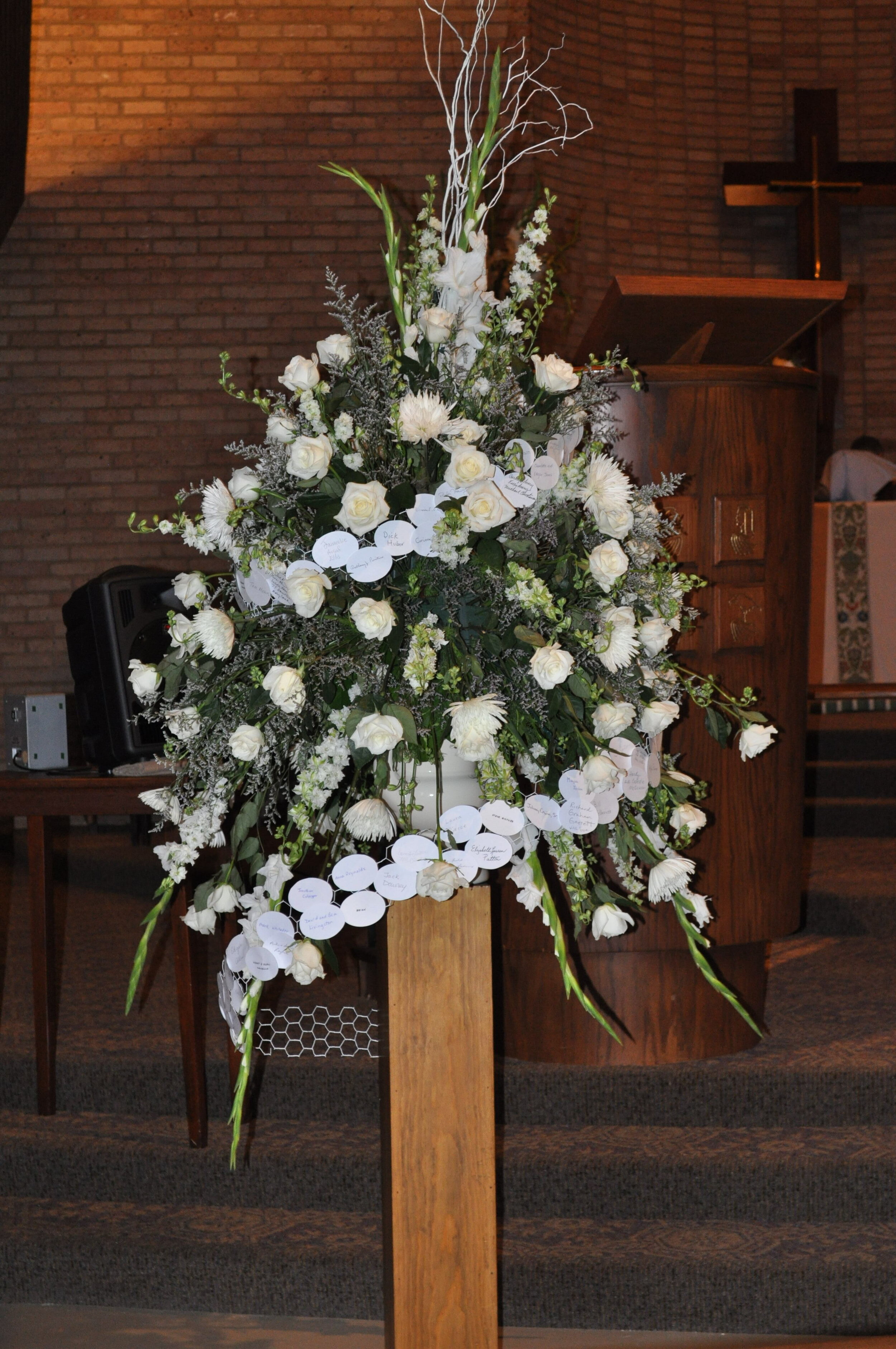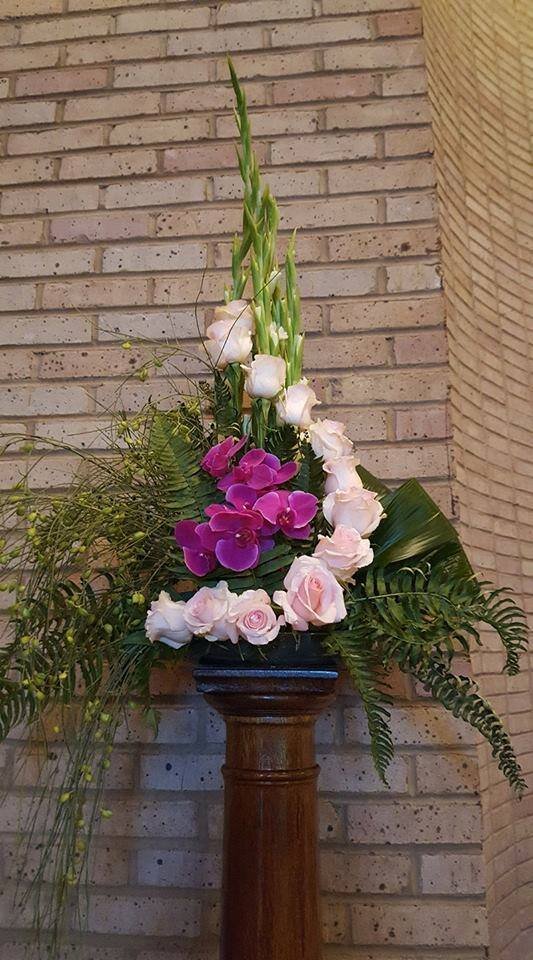Sacraments are outward and visible signs of inward and spiritual grace.
— Book of Common Prayer, p. 857
In addition to the sacraments Jesus commanded of his followers ― Baptism and Eucharist (Holy Communion) ― the Church recognizes other spiritual markers in our journey of faith. These help us to be a sacramental people, seeing God always at work around us.
They include the Rites of
Confirmation ― the adult affirmation of our baptismal vows
Marriage ― the solemn and public declaration of commitment between two persons that provides for the legal obligations of marriage and the blessing of the Church
Prayers for the Sick or Dying ― healing prayer and anointing with oil upon those who are ill, and prayers and anointing when a person is close to death or has died
Burial ― the celebration of a Christian life who now rests from their labors
Rite of Baptism
Go therefore and make disciples of all nations, baptizing them in the name of the Father and of the Son and of the Holy Spirit, and teaching them to obey everything that I have commanded you. And remember, I am with you always, to the end of the age.
Matthew 28:19-20
After a period of preparation, candidates for baptism make fundamental Christian commitments outlined in The Baptismal Covenant. These commitments define what the baptized life is and outlines the efforts one will make through their discipleship. Baptism is always a public rite because it is the sacrament by which God adopts us as children and makes us members of Christ’s Body, the Church, and inheritors of the Kingdom of Love. We use water to signify this entrance because of the ways in which God has used water throughout salvation history: to create the cosmos, to free our ancestors from slavery in Egypt, and to recall the very waters by which Jesus was blessed and named as God’s Beloved Son. Not just an “adoption ceremony,” Baptism is our commitment to renounce evil, repent of our missteps and accept Jesus as the one who restores us to unity with God. As such, we use chrism, or special oil, to make the sign of the cross on the forehead of the newly baptized, signifying that they are now “marked as Christ’s own forever.”
While we almost always hold Baptism during a Sunday morning service, we have occasionally also baptized persons in rivers or lakes. An open water baptism is a less formal affair, but no less powerful to be a witness to.
If you are interested in Baptism, please contact the Rector.
Rite of Confirmation
Now when the apostles at Jerusalem heard that Samaria had accepted the word of God, they sent Peter and John to them. The two went down and prayed for them that they might receive the Holy Spirit (for as yet the Spirit had not come upon any of them; they had only been baptized in the name of the Lord Jesus). Then Peter and John laid their hands on them, and they received the Holy Spirit.
Acts 8:14-17
Confirmation is the rite in which candidates express a mature commitment to Christ, one for which they have prepared for some time, and one they understand makes them a “full member” of the Church. Modeled after the mysterious happenings of Pentecost, confirmands also receive strength from the Holy Spirit through the prayer and laying on of hands by a bishop.
Typically, Confirmation is held when the Bishop of Tennessee visits Saint David’s at the time of his annual visitation, usually the third Sunday of Advent. Candidates have gone through a preparatory course for several weeks with the Rector so that they gain an understanding of the theology, history, liturgy, governance, and values of the Episcopal Church.
All baptized persons can become “full members” of Saint David’s and will be able to participate in all programs and ministries if they are over age 16 or older. Only through Confirmation can members become eligible to serve the parish in an elected position on the Vestry or in a diocesan office.
If you are interested in being confirmed or would like to participate in the Inquirers’ Class, please contact the Rector at (615) 352-0293 or email office@saintdavidsnashville.org.
Celebration and Blessing of a Marriage
The union of two people in heart, body, and mind is intended by God for their mutual joy; for the help and comfort given one another in prosperity and adversity…. Therefore marriage is not to be entered into unadvisedly or lightly, but reverently, deliberately, and in accordance with the purposes for which it was instituted by God.
Liturgical Resources 2, 79th General Convention, 2018
The Celebration and Blessing of a Marriage is the sacrament in which two persons "enter into a life-long union, make their vows before God and the Church, and receive the grace and blessing of God to help them fulfill their vows" (BCP, p. 861). An important section of this rite occurs when the congregation stands and is asked to commit to supporting these two persons in their lifelong relationship. An exchange of vows, the blessing and exchanging of rings, prayers, and a final priestly blessing bestow the legal status of marriage and the blessing of the Church upon the couple.
While the Rector will counsel the couple regarding the theological aspects of this sacrament, the couple will receive no less than four, and preferably six to eight, sessions of premarital counseling from a pastoral counselor, a licensed family and marriage therapist or one whose vocational focus is marital preparation. This person shall be vetted by the Rector.
The Rite of Marriage will come from one of several sources, depending upon the decision of the couple in tandem with the Rector. The Book of Common Prayer provides for the Celebration and Blessing of a Marriage (visit page 423), but now the Episcopal Church may use two different blessings with many choices that were recently approved at the 2018 General Convention. You may visit the Liturgical Resources 2 here. Canon law requires that at least one of the couple be a baptized Christian.
Weddings at Saint David’s are always conducted by Saint David’s clergy; however, other clergy may be invited to participate with prior approval from the Rector. At least one member of the couple must be a member in good standing of Saint David’s for at least one year. Please note weddings are not scheduled during Lent, Holy Week, or on Christmas Eve or Day.
If you have questions, need to inquire about dates, or would like to arrange for premarital counseling, please contact the Rector at (615) 352-0293.
Burial of the Dead
I am Resurrection and I am Life, says the Lord.
Whoever has faith in me shall have life, even though they die.
And everyone who has life,
and has committed himself to me in faith, shall not die for ever.
John 11:25-26
What is the rite of burial like?
These words are the first words of the Episcopal Burial of the Dead, Rite II, and they define the overall theme of this final sacrament. Some say the Episcopal Church “does death well” because of the way in which we not only celebrate the life of the one who has died, but their belovedness, their Divine-forged createdness and their witness to both of these vital elements of human living. Those who leave before us enjoy the fullness of God’s presence as they rest from their life’s labors. For those who mourn their bodily absence, the rite of burial offers us words for abundant living now by affirming our grief and encouraging the growth that can emerge from it. Above all, the Episcopal Burial of the Dead proclaims a joy in the certainty that nothing can separate us from the love of God in Christ Jesus.
How do I plan a burial service?
The Rector encourages everyone--no matter what age--to plan your Rite of Burial as soon as possible and have it on file in the Parish Office. Planning ahead in this manner can help you order other aspects of your life as well. Indeed the very process of planning your final disposition can offer you opportunity for reflections on how you are living now. Furthermore, having “what you want” already planned will be of tremendous comfort and help for those who love you. The Rector will work with you on scripture choices, lay leaders, hymns and an overall tone of the service.
What if my loved one is not Christian?
While the majority of our Burial services are for those who profess Christ as Savior, the Episcopal Church also celebrates a rite called the “Burial of One Who Does not Profess the Christian Faith.” As we have said before, we welcome everyone, honoring each as a beloved child of God. In Eucharistic Prayer D we pray, “Remember all who have died in the peace of Christ, and those whose faith is known to you alone; bring them into the place of eternal joy and light.” If you are seeking the rite of burial for one whose faith is known to God alone, please talk with our Rector who will help you organize the service.
Do you have a cemetery or should I go to a funeral home?
Saint David’s inters cremated remains in two areas: our columbarium and the clearing on the hill.
In 2003, Saint David’s added a columbarium to its campus. It sits just next to Sanders Hall and has 136 niches. Some already hold the remains of beloved members and family members, while other niches have been reserved, in much the same way you might buy a burial plot in a cemetary. The columbarium’s by-laws require that columbarium niches be occupied by members and family of Saint David’s. At present, you may reserve a niche at $1,000, which covers the cost of the space, the urn and the cover plaque engraving.
Saint David’s also lays to rest the ashes of loved ones in the earth of the hill above the church. At the top of the hill is a clearing with a fire circle. There, many rest in peace among the cedars, wild phlox, foxes and hawks. Presently there are very few grave markers, though soon we hope to be able to place discreet GPS markers at the site of internments. A plaque on the wall outside Sanders Hall publishes the names and dates of those interred on the hill. The cost of internment here is $250, which covers the cost of trail maintenance and the plaque engraving. Please know that the clearing on the hill connects two trails that make their way up two different sides of our large hill. Parishioners and many neighbors enjoy walking their dogs or just spending time in the quiet of this space. While this is sacred space, as our signs indicate, it is also visited space.
For information regarding either of these two options, please contact the Parish Office.




